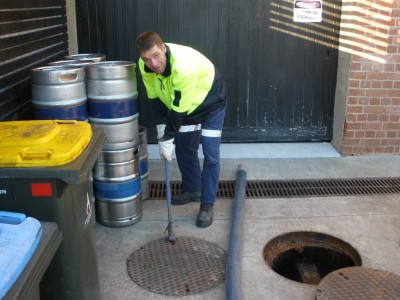08 8162 5544
Call us today for the best waste and recycling rates in Adelaide

Scum and Sludge: How, When and Why to Clean Your Septic System
Septic systems are typically found in regions that are relatively isolated. If you live in a South Australian Rural area it is likely that you have an independent waste water system. Every homeowner with a septic system needs to be aware of the waste removal and disposal processes that come with owning such a system.
How Septic Systems Work
Every septic system needs to be pumped and cleaned on a regular basis. The frequency that a septic system needs to be pumped depends on its size and the number of people in your household. Failing to regularly empty a septic tank when it needs to be cleaned may damage your system and lead to expensive repairs. There isn't any need to clean a septic tank more frequently than necessary.
A standard 2200 litre septic tank attached to a home containing 4 people will need to be pumped out every 3 years. The more people using a septic system, the sooner the waste in the tank will need to be removed. Similarly, the larger the tank, the less frequently the waste in the septic tank should be removed. Most homes will generally need to have their septic system pumped every 3 to 5 years.
A septic tank can be imagined as a giant underground waste bin, containing two chambers. It is generally always full of water and whenever household water waste is flushed into the septic system, the waste generally separates into two categories: scum and sludge. Scum is composed of grease and fats that float to the surface of the tank while sludge is composed of all other solids and generally sink to the bottom of the tank.
Whatever volume of waste water is put into a septic tank will displace the water between the scum and the sludge into the second chamber of the tank. Some scum and sludge may enter this chamber as well depending on the composition of the effluent waste water. Water that is displaced from this second chamber then flows into a leaching bed where it is slowly absorbed by soil. Any impurities remaining in this water are digested by micro-organisms present in the soil, a process which purifies the water and doesn't present an environmental risk. In fact, micro-organisms are present in the septic tank itself and break down organic matter. This greatly reduces the volume of scum and sludge (a rate of 50% volume reduction is common).
Pumping and Cleaning Septic Tanks
When it is time to empty a septic tank, you need professional help. The waste collection process requires specialized machinery and a liquid hauled waste permit from SA Water. A professional waste management professional or liquid waste hauler will start by opening the cover of the tank and places a giant hose connected to a special hauling vehicle and begins pumping the waste water from the septic tank.
The operator makes sure to remove all of the scum and sludge from the tanks chambers. Often the operator will measure the scum and sludge levels to help determine more accurately the frequency of which the tank needs to be pumped. Once the waste water is removed from the tank, the operator will provide a receipt and proceed to haul the liquid waste to one of the many waste water treatment plants around Adelaide.
Environmental Considerations
A septic system only poses an environmental hazard if it is improperly used or if it breaks. For example, if too much waste water is placed into the septic tank then it is possible for the system to be incapable of handling the load leading to leaching bed malfunctions. Overly impure water could leach into the soil at a rate faster than what the soil can naturally digest. This results in algae blooms in nearby bodies of water.
Thankfully, it is easy to determine quickly if a septic tank is malfunctioning. Typical signs that something is amiss include: slow drains (toilet, shower, sink, etc.), the grass covering the septic tank is particularly green and spongy or even may be forming puddles, strange odours are emitted from pipes and ditches, as well as oddly coloured liquids appearing on your property.
Septic Systems Around Adelaide
There are plenty of businesses and residences around Adelaide that have septic systems. Signal Waste and Recycling Services is proud to offer septic tank pumping and cleaning services to a myriad of clients ranging from wineries, private schools, commercial and residential real estate companies, strata and property managers, plumbers, churches, the mining industry, houseboat owners to beach shack owners. If you're in need of a waste management solution for your business or home's septic system, there isn't a better choice than Signal Waste and Recycling Services.




